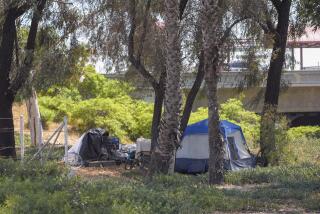Homeless
- Share via
Thanks for the article regarding the homeless couple who couldn’t find emergency shelter because the wife was in a wheelchair (Metro, June 24). I clipped it out and put it in the file next to the one you printed March 8 about the homeless Vietnam veteran, also in a wheelchair, who had a difficult time finding an accessible shelter willing to take him.
In my work at the Westside Center for Independent Living, I help people with disabilities and seniors to maintain their independence within the community and avoid costly institutionalization. Adequate affordable and accessible housing is vital to that effort. Because of skyrocketing costs for housing and a real lack of community support services, there is an unacceptably large number of homeless people who are also disabled.
Unfortunately, the sensitivity of shelter providers has not kept up with this growing population. I recognize that providers of emergency shelter are being asked to fulfill a lot on the smallest of budgets. Still, when shelter requests involve homeless individuals with disabilities, all too often providers’ first concern is liability.
Some shelter providers and government funders suggest creating new shelters to serve only homeless people with disabilities and seniors. History too clearly shows that separate is never equal. There are a variety of shelters to serve a variety of needs: substance abusers, battered women, shelters for chronically mentally ill, emergency shelters for homeless families and runaway youths. People with mobility impairments fall into all these categories. As a result, all these categories need accessible facilities. For that to occur, there must be an assessment of need and development of a plan that makes shelter services available to all. Needless to say, there must be funds for this to be achieved.
Your reports keeps us mindful that we have a way to go in achievement of the “kinder, gentler society.”
DENNIS MEEHAN
Housing Advocate, WCIL
Los Angeles
More to Read
Sign up for Essential California
The most important California stories and recommendations in your inbox every morning.
You may occasionally receive promotional content from the Los Angeles Times.






